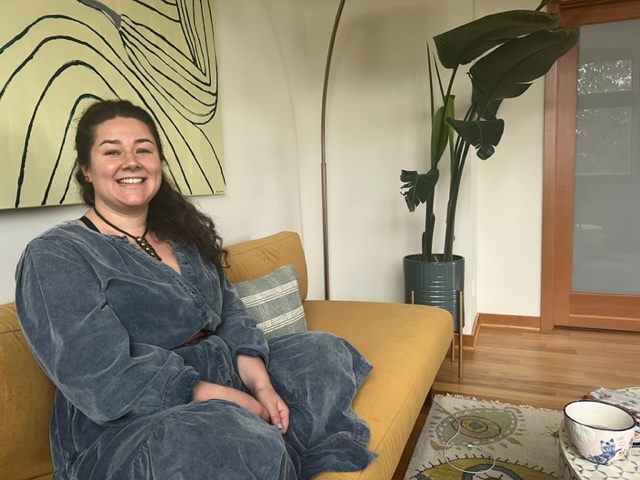We’ve all been there. News of a fast-moving tragedy fills our news feeds and we find ourselves constantly checking our phones for updates.That’s what happened to Yulia Tolskaya when she found out about Russia invading Ukraine. “I didn’t want to just stare at the news and get depressed,” Yulia says, “it was important for me to do something to help.”
Yulia is Russian American. She found out about a volunteer opportunity through her Russian-speaking community which Companis’ Jennifer Wing, Associate ED of Programs, tapped into. Jennifer put the word out that our nonprofit partner Lutheran Community Services Northwest (LCSNW) needed Russian translators to assist with the resettlement of hundreds of Ukrainians following the Russian invasion on February 24, 2022. Yulia stepped up to be a Russian-English translator for two online classes for older Ukrainian refugees through the agency’s Senior Services Program. The classes focus on basic English and civics lessons needed to pass the U.S. citizenship test.
“It’s especially hard to move to a new place and not speak the language when you’re older,” she says, “but I’m really impressed with these people. They are just so positive despite the hard situation they’re in.”
Since the invasion of Ukraine a year ago, LCSNW has resettled more than 250 Ukrainian refugees in the Puget Sound and Portland-Vancouver area. The agency also offers a variety of services for Ukrainians who were already here and for those seeking asylum from the war, including many seniors. Services include language classes, housing assistance, and medical equipment for elders.
Yulia says her family has a history of volunteering, as well as her Russian friends. “Many of them are finding a way to be helpful with the Ukrainian war situation.”
Yulia moved to the United States when she was nine. She now lives in Seattle with her family. “When I came to the U.S. we had so many lovely people who helped us. And when my husband came over from Ukraine, he also had a similar experience. So I think there’s a bit of wanting to pay it forward and make sure other people have a good experience.”
Yulia has an air of calm about her as she talks about her busy life with two young children (ages two and six). She said after she said “yes” to this volunteer opportunity she started to worry. “At first, I didn’t know whether I would be good at it. But it’s been better than I expected. The students are really engaged and even though it’s hard for them, they’re not giving up.”
Yulia says she and her husband are raising their children to be bilingual. “On a most basic level, I want them to be able to communicate with our family members who speak Russian but don’t speak English. Also, knowing another language connects you to more people in the world, and that makes it easier to offer help.”
As the babysitter comes in with Yulia’s two-year-old daughter, she introduces her small child and her caretaker and then excuses herself to get on Zoom for an hour with her Ukrainian students. It’s clear that her days are packed, but she makes it work. When asked how she manages to fit volunteering into her busy schedule, she smiles and says, “It’s pretty personal to me. And, you know, it definitely beats doom scrolling.”

